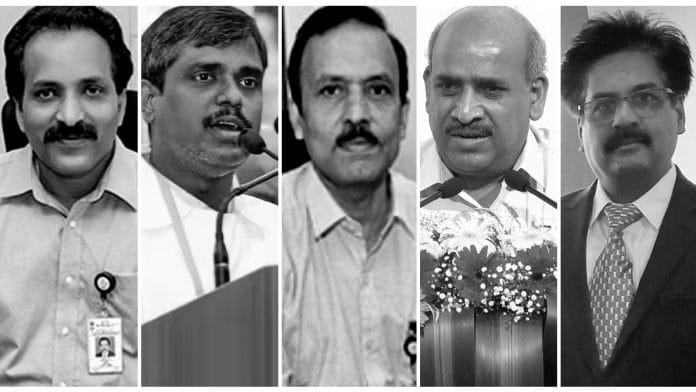New Delhi: Hours before India’s Chandrayaan-3 mission made a soft landing on the Moon’s surface Wednesday, the first country to land a spacecraft near the lunar south pole, mission directors at Indian Space Research Organisation (ISRO) were busy preparing for what was to be a historic moment in the nation’s space mission.
Here is a look at the key faces driving the Chandrayaan-3 mission.
S Somanath, ISRO Chairman
The ISRO chairman has become a household name after he assumed the leadership of the space agency in January last year. Since then, Somanath has become the face of India’s third lunar mission.
Somanath has served as director of the Vikram Sarabhai Space Centre (VSSC) as well as the Liquid Propulsion Systems Centre — both of which are driving the development of rockets for ISRO.
His expertise lies in the area of system engineering of launch vehicles, and he has made significant contributions to the design and development of PSLV and GSLV MkIII, now known as Launch Vehicle Mark-III. Both these launch vehicles have a long track record of successful launches.
P Veeramuthuvel, Chandrayaan-3 Project Director
Veeramuthuvel, who hails from a humble family in Tamil Nadu’s Villupuram, took charge as the Project Director of Chandrayaan-3 in 2019. The IIT-Madras alumnus was earlier the Deputy Director at the Space Infrastructure Programme Office at ISRO’s main office.
He has been part of various projects including a number of on remote sensing satellites, India’s Mars Orbiter Mission ‘Mangalyaan’ and, more recently, Chandrayaan-2 and Chandrayaan-3.
S Unnikrishnan Nair, Vikram Sarabhai Space Centre Director
Nair is the director of Vikram Sarabhai Space Centre (VSSC) in Kerala. VSSC was responsible for developing the Launch Vehicle Mark-III. As the head of VSSC, Nair and his team oversee various aspects of the Chandrayaan-3 mission.
Beginning his career at VSSC Trivandrum in 1985, he has made significant contributions in launch vehicle mechanisms, acoustic protection systems and payload fairing areas during his tenure.
Apart from this, Nair is also the first director of Human Space Flight Centre, Bengaluru. He has an expertise in leading advanced projects like Human Spaceflight, Air Breathing Propulsion and Reusable Launch Vehicle Development.
Nair played a key role in the maiden orbital reentry experiment, Space Capsule Recovery Experiment (SRE), right from the study phase onwards to its mission accomplishment in 2007. He has made seminal contributions in developing the parachute and other recovery systems for re-entering vehicle for the first time in the country.
The senior scientist has also played a pivotal role in lining up various national agencies including the services for formulating the recovery procedures and implementation for the recovery of SRE from sea.
M Sankaran, U R Rao Satellite Centre Director
Since 2021, Sankaran has been director at U R Rao Satellite Centre (URSC), which is responsible for developing satellites that meet India’s diverse needs such as communication, navigation, remote sensing, weather forecasting, and planetary exploration.
Before taking over as URSC head, Sankaran was functioning as Deputy Director for Communication and Power Systems Area in URSC and spearheading the developments.
During his 35 years of stint in URSC and ISRO, he has contributed primarily in the areas of solar arrays, power systems, Satellite Positioning System and RF communication systems for Low Earth Orbit (LEO) satellites, geostationary and navigation satellites, and outer space missions like Chandrayaan, Mars Orbiter Mission (MOM) among others.
He has been instrumental for developing a unique design for power generation and distribution systems for the interplanetary mission like Chandrayaan-1 & 2, Mars Orbiter Mission, Astrosat, etc.
A Rajarajan, Satish Dhawan Space Centre Director
As director of Satish Dhawan Space Centre, Rajarajan’s team works on the Launch Complex Infrastructure to meet ISRO’s increased demand for launches.
Previously, he has held the responsibility as Deputy Director of various VSSC entities from time to time including the ‘Propulsion and Space Ordinance Entity (PRSO), Aero Space Ordnance Entity (ASOE), Composites Entity (CMSE) and Structures Entity (STR)’.
He has extensively worked in the area of design and development of composites products and played a pivotal role in developing many innovative technologies for the development of composites for satellites and launch vehicle subsystems.
In 2017, he was assigned an additional responsibility as Deputy Director of Propulsion and Space Ordinance Entity (PRSO), post PSLV C39 mission failure. Rajarajan has steered the team in addressing the issues and improving the reliability of the system along with improvement in analytical methods of systems.
(Edited by Tony Rai)
Also Read: Curious about what Chandrayaan-3 aims to do? All about its payloads & how they’ll help scientists






